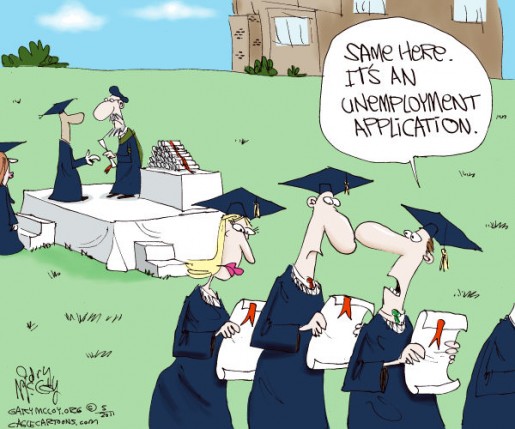 In an earlier posts I discussed the ROI of education from both a personal perspective and a business perspective. What have you decided about your education? If you have kids, do you think they would place their ROI on the higher end of the spectrum or the lower end? If, like me, you don’t think your education was entirely worth the cost, then you’re not alone. With rising prices of already over-inflated costs of higher education, a continued lack of jobs in most fields, and the stress that comes with this scenario, college is seen more and more as a rip-off, especially by teens on their way to university life. While I can say that my own education was worth about 70% of the cost I paid for it, it’s getting worse for those that are coming after me. Despite the many promises of higher paying jobs after university, many of the students I taught just a couple of years ago in an average Midwest high school want nothing to do with college, and their parent’s don’t either.
In an earlier posts I discussed the ROI of education from both a personal perspective and a business perspective. What have you decided about your education? If you have kids, do you think they would place their ROI on the higher end of the spectrum or the lower end? If, like me, you don’t think your education was entirely worth the cost, then you’re not alone. With rising prices of already over-inflated costs of higher education, a continued lack of jobs in most fields, and the stress that comes with this scenario, college is seen more and more as a rip-off, especially by teens on their way to university life. While I can say that my own education was worth about 70% of the cost I paid for it, it’s getting worse for those that are coming after me. Despite the many promises of higher paying jobs after university, many of the students I taught just a couple of years ago in an average Midwest high school want nothing to do with college, and their parent’s don’t either.
Just because people are beginning to seriously question and even reject the cost of university, that doesn’t mean that they can’t find value and worth. They just have to create it themselves. This means creating the desire to learn, the wish to work with others for the training, and the desire to make the most of the community surrounding university life. Sadly, maximizing your perceived ROI is no guarantee for a job, let alone a career you enjoy. There is some conjecture that the only university degree’s that are worth having will eventually be those from elite schools. What gives me this idea? Well, venture capitalists are known for seeing trends before they are obvious, and investing millions in them. An online version of an Ivy League school called Minerva has been created, and they invested $25 million in the concept.
But how would we get training and knowledge if there was no higher education?
But what if there was another way? The Atlantic has a great article hypothesizing what that world without universities degrees will be like. They talk about e-learning and online certificates, both methods are already widely used and widely available through high-end schools like MIT and others. Of course, as The Atlantic article notes, certificates which are cheaply obtained but take just as much work to get are going to be the preference of students, though it’s possible that businesses might take a little while to catch on.
Though, I have taken a few classes from both MITx and Coursera as well as a few others to test their viability for my hiring process. I will not say they are as difficult as getting up to get to the early morning classes, but it really doesn’t take much less effort than taking a course in a physical class room. You still have the same materials, the same quizzes and tests, and the same work load in the same time constraints. What you don’t have is the stress of worrying about how to pay tuition fees if you buy groceries or pay rent. The cost of certificates to prove that you have taken the classes are significantly less than those of a class. Yet, many companies recognise the value of certificates as a standard of learning.
There is the blossoming and thriving “maker culture”. Whether you’re making books or working on science, you’ll need equity. There are even grants that offer $100,000 for kids to drop out of school and go into business. Jeremy Rifkin, economist and founder of the Founder for Economic Trends, talks highly of the Third Industrial Revolution, which is centered around these makers and their push forward.
Where does this leave universities and higher education?
 According to The Atlantic article, they will be research centers. That makes sense, really, as that’s what they are doing now in the bulk of their time anyway. Professors are already expected to do research, publish, and teach. However, if they aren’t required to teach, they can just focus on research and publication like many other well-known research schools, teaching will likely be pushed a little more to the side and thought of more like mentoring.
According to The Atlantic article, they will be research centers. That makes sense, really, as that’s what they are doing now in the bulk of their time anyway. Professors are already expected to do research, publish, and teach. However, if they aren’t required to teach, they can just focus on research and publication like many other well-known research schools, teaching will likely be pushed a little more to the side and thought of more like mentoring.
In fact, University of California is already heading in this direction by becoming venture capitalist for projects that originate from the UC system. While they are not turning their school system directly into a research only facility, they are investing in startups. The trend bringing together the traditional concept of universities and commercialization is continuing, all the while getting more sophisticated and integrated as a whole.
While the debate rages on whether this will allow universities to remain relatively unbiased in research integrity, we are still asking the question if the education they provide will be worth it in the end. Or, will online classes replace physical universities while they take on a different role? Only time will tell, but for today universities do offer a valuable option for students: on the job training while learning the theoretical basis for their craft.
Your thoughts?
How do you see the futures of universities playing out?







